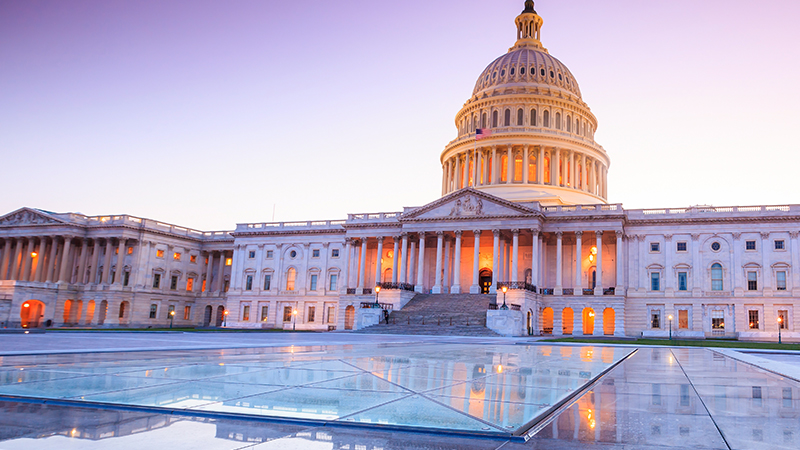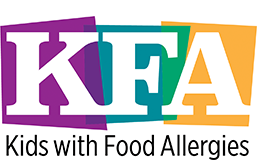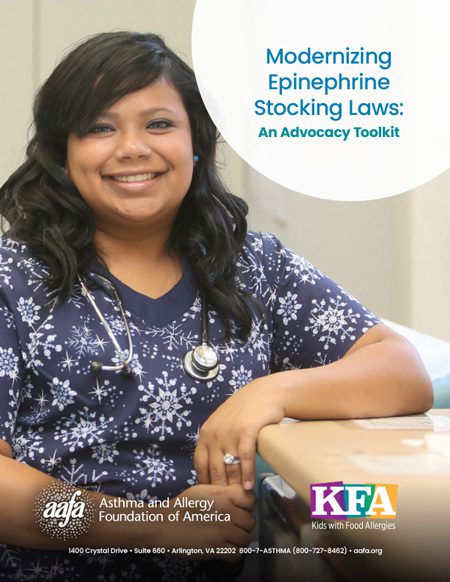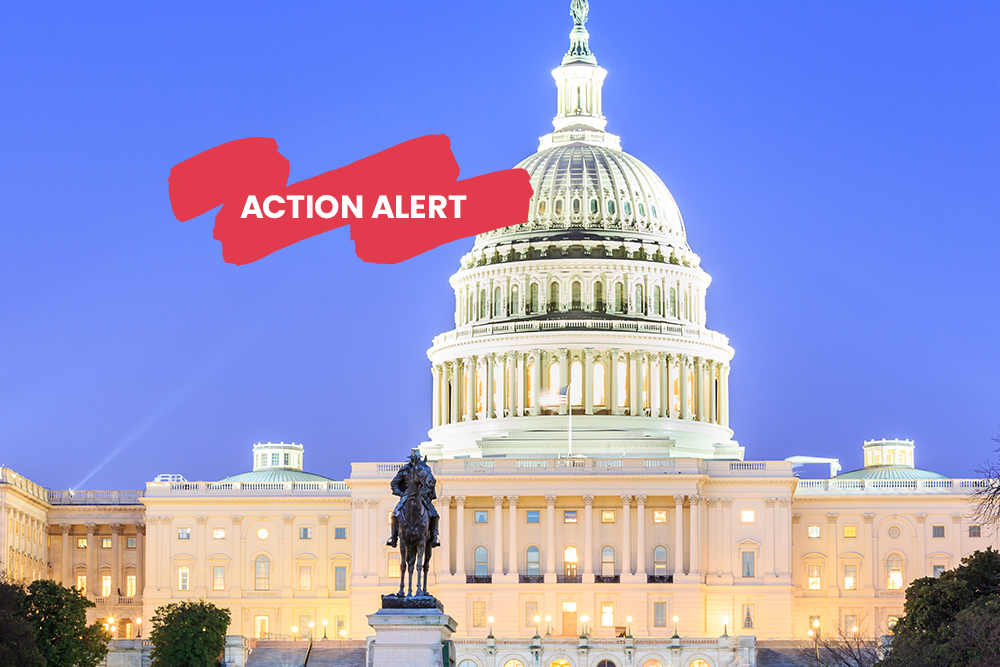Advocacy

Epinephrine Access
The Asthma and Allergy Foundation of America (AAFA) and its food allergy division, Kids with Food Allergies (KFA), supports policies that require access to life-saving epinephrine to treat people who have severe allergic reactions.
Foods, drugs, latex, and stinging and biting insects are some of the most common causes of anaphylaxis, a severe allergic reaction. Anaphylaxis can have life-threatening complications. A medicine called epinephrine is the first-line treatment for a severe allergic reaction called anaphylaxis. It is critical that people have access to epinephrine.
AAFA and KFA support a number of policies that will make it easier to get and afford epinephrine, including:
- Promoting policies that increase access to epinephrine for all children and families with food allergies
- Supporting laws and policies that make easy-to-use epinephrine available in schools, child care facilities, restaurants, planes, and other public places
- Supporting policies to secure and maintain the national supply of epinephrine
Entity Stocking – Access to Epinephrine in Public Places
A person with a history of anaphylaxis must carry epinephrine with them wherever they go. But allergies can appear at any time of life. That makes public access to epinephrine an important in places where food is often present, such as schools, sports and recreation venues, summer camps, amusement parks, movie theaters, and other public places or “entities.”
Many states have passed entity stocking laws, but there is still more to be done to encourage the remaining states to pass this type of law. People may also hesitate to give someone else epinephrine for fear of responsibility.
AAFA and KFA ask state lawmakers across the U.S. to support entity stocking laws and protection for people who use it in good faith.
See where your state stands on entity stocking.
Epinephrine in Schools
Food allergies continue to be a growing problem, especially among young children. Around 20 million people in the United States have food allergies and 4 million are children. These children spend much of their day in school. Food is naturally part of the school day, so they may be exposed to food allergens that can trigger a severe allergic reaction. This severe allergic reaction can be life-threatening if not treated promptly.
AAFA and KFA feel states should implement policies that promote access to epinephrine, including:
- Supplying schools with easy-to-use epinephrine be used in emergencies
- Training school staff
- Addressing liability concerns for people who use epinephrine in good faith.
AAFA urges state lawmakers to make the simple decision to save young lives. Schools should have access to undesignated easy-to-use epinephrine and staff should be trained on how to use them.
See where your state ranks on epinephrine in schools in our 2025 State Honor Roll of Asthma and Allergy Policies for Schools.
Modernizing Epinephrine Stocking Laws
Emergency treatment options for anaphylaxis are rapidly advancing, but state laws on medication stocking have not kept pace. In 2024, the Food and Drug Administration (FDA) approved the first epinephrine nasal spray and is currently reviewing an epinephrine sublingual film, with further innovations expected in the future. Most state laws specify only epinephrine auto-injectors, limiting schools’ ability to access different treatment types. By broadening language to include all forms of epinephrine, states can ensure that schools are prepared for current and future medical innovations.
AAFA has an advocacy toolkit to help you advocate for epinephrine stocking in your state. The “Modernizing Epinephrine Stocking Laws: An Advocacy Toolkit”  includes:
includes:
- A guide on how to find and contact your state legislators
- Tips for communicating with lawmakers and their staff
- Sample letters to help you share your concerns and policy recommendations
The sample letters are customized depending on your state’s current laws.
Insurance Coverage and Pricing
People and families managing severe allergies often bear a heavy and rising cost burden for epinephrine They need affordable lifesaving epinephrine. AAFA and KFA are actively advocating for affordable access to epinephrine.
Our Advocacy Efforts for Epinephrine Access
AAFA and KFA support policies and laws that save lives and improve the quality of life for millions of people and families managing food allergies. Because this issue is one of our key policy priorities, we have been actively working to on behalf of the food allergy community to spread awareness to policymakers and other stakeholders. Here is some of the work we have been doing:
AAFA Sends Letter Supporting Elijah’s Law in California ![]() – May 30, 2024
– May 30, 2024
AAFA Sends Letter Supporting Zachy’s Food Allergy Safety Treatment Act ![]() – March 21, 2024
– March 21, 2024
AAFA Comment Letter on Virginia’s Revisions to the Standards for Licensed Child Day Centers ![]() – January 31, 2024
– January 31, 2024
AAFA Sends Memorandum of Support for NY Bill to Improve Epinephrine Affordability ![]() – December 21, 2023
– December 21, 2023
AAFA’s Statement Regarding the FDA Decision on Needle-Free Epinephrine Nasal Spray ![]() – September 20, 2023
– September 20, 2023
AAFA Sends Letter Supporting The Muñoz SAFE Act ![]() – September 20, 2023
– September 20, 2023
AAFA Sends Letter Urging EMK Provision in 2023 FAA Reauthorization Bill ![]() – May 10, 2023
– May 10, 2023
AAFA Sends Comment Letter to FDA Supporting Nasal Epinephrine Spray ![]() – April 27, 2023
– April 27, 2023
AAFA Signs Comment Letter Supporting Nasal Epinephrine Option ![]() – April 26, 2023
– April 26, 2023
AAFA Sends Letter to CA Assembly Appropriations Committee Supporting The Muñoz SAFE Act ![]() – April 20, 2023
– April 20, 2023
AAFA Sends Food Allergy Policy Priorities to White House ![]() – July 21, 2022
– July 21, 2022
Illinois Passes Elijah’s Law to Prevent Severe Food Allergy Reactions in Child Day Care Programs – August 20, 2021
AAFA Sends Memorandum in Support of S.1043![]() – February 12, 2021
– February 12, 2021
AAFA Sends Letter Supporting Anaphylaxis Related Bill S.7085![]() – March 10, 2020
– March 10, 2020
AAFA Sends Letter Expressing Support for S.B. 477![]() – February 28, 2020
– February 28, 2020
AAFA Sends Letter Supporting S.B. 530![]() – January 30, 2020
– January 30, 2020
AAFA Sends Letters Expressing Support for S.B. 642![]() – January 17, 2020
– January 17, 2020
New York Passes Gio’s Law That Authorizes Emergency Responders to Treat Anaphylaxis – December 13, 2019
AAFA Sends Letter Supporting Dockets Relating to Epinephrine and Anaphylactic Policies![]() – December 3, 2019
– December 3, 2019
New Illinois Law: Insurance Companies Must Cover Epinephrine Injectors for Children – August 14, 2019
New York Residents: Ask Governor Cuomo to Sign Gio’s Law – June 24, 2019
Connecticut and Texas Sign Laws to Stock Epinephrine in Public Places – June 17, 2019
AAFA Applauds Walgreens and kaléo Partnership, Increasing Patient Access to Life-Saving Epinephrine![]() – September 10, 2018
– September 10, 2018
Letter to the Department of Health and Human Services: People With Allergies Need Access to Epinephrine – August 24, 2018
Allergy Protocols in Federal Facilities![]() – April 22, 2016
– April 22, 2016
South Carolina’s Emergency Anaphylaxis Treatment Act![]() – February 23, 2016
– February 23, 2016
Become an Advocate
You can help us advocate on this issue and others to help reduce the burden of food allergies. Learn more about becoming a food allergy advocate and watch this page for updates on ways you can raise awareness about this issue.













